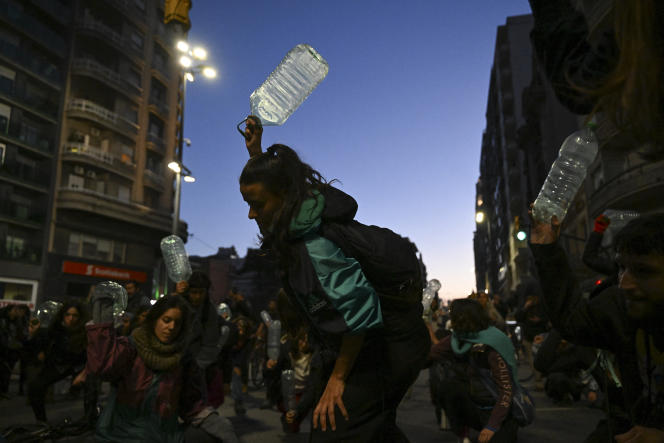At the end of April, José Miguel, a retiree from Montevideo – the capital of Uruguay – made himself a coffee with tap water. He pushed it away from the first sip: undrinkable. “I ran to buy mineral water, then a filter worth 350 dollars [320 euros]. It’s an investment”reports this resident ” angry “ against the government. He is not the only one to turn away from running water for weeks, while the country is going through the most serious water crisis in its history this year.
“Between 2020 and 2022, we recorded the same level of precipitation as that of two normal years, i.e. 2,450 millimeters in Montevideo and its region in three years”, notes Raul Viñas, meteorologist and member of the environmental NGO Movimiento por un Uruguay Sustentable (“movement for a sustainable Uruguay” – Movus). This is the most severe drought experienced by the country, under the combined effect of the natural episode La Niña – resulting in this region of the world by a lack of precipitation – and climate change. For lack of rain, the sources supplying Montevideo and its region, a territory which is home to around 60% of the population of this country of 3.4 million inhabitants, are reaching a historically low level.
In order not to be confronted with dry taps, the OSE (Obras Sanitarias del Estado, the public water distribution company) found this solution in April: mix the little remaining reserve with water from the estuary, the Rio de La Plata, salty due to its proximity to the Atlantic Ocean. “However, we do not have the necessary infrastructure for the purification of salt water”notes Daniel Greif, engineer and head of water management in the previous government, led by the left, between 2015 and 2020.
” Disgusting “
Thus, on May 5, OSE officially approved the modification of the sodium and chloride limit levels initially provided for in the standard, i.e. respectively 440 milligrams per liter (compared to 200 mg/L originally) and 720 milligrams per liter (compared to 250mg/L). A measure taken with the approval of the government of President Luis Lacalle Pou (center right). Result, in the glass of water of Uruguayans: a pronounced salty taste, often described as ” disgusting “.
Faced with the concern of the inhabitants, the government ensures that the water remains clean for consumption. However, the Ministry of Health advises against its ingestion for people suffering from chronic kidney disease, hypertension, heart failure, cirrhosis and pregnant women.
You have 67.26% of this article left to read. The following is for subscribers only.
